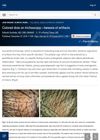 December 2018 in “Journal of harmonizrd research in applied science”
December 2018 in “Journal of harmonizrd research in applied science” Yoga and Ayurveda, including stress management and herbal oil use, can potentially reduce hair loss and promote hair growth, with further research needed for therapy protocols.
 August 2016 in “Journal of Investigative Dermatology”
August 2016 in “Journal of Investigative Dermatology”  August 2016 in “Journal of Investigative Dermatology”
August 2016 in “Journal of Investigative Dermatology”  August 2016 in “Journal of Investigative Dermatology”
August 2016 in “Journal of Investigative Dermatology” 
The system can automatically identify different hair and scalp conditions using machine learning.
 January 2024 in “Biochemistry Research International”
January 2024 in “Biochemistry Research International” Compounds from Ziziphus spina-christi roots show strong antibacterial and antioxidant potential.
51 citations,
January 2014 in “International journal of trichology” Shampoo pH can affect hair health, with alkaline shampoos potentially causing damage and acidic shampoos reducing frizz.
4 citations,
October 2017 in “Indian drugs” Hibiscus rosa-sinensis L. leaves and flowers contain various compounds with potential medicinal uses.
2 citations,
July 2018 in “Journal of drug delivery and therapeutics” Onion and eucalyptus oil shampoo effectively treats dry hair and promotes hair growth.
 1 citations,
August 2023 in “Journal of cosmetic dermatology (Print)”
1 citations,
August 2023 in “Journal of cosmetic dermatology (Print)” Too much selenium can cause hair loss and nail problems.
1 citations,
December 2011 in “Ophthalmology” Tea tree oil shampoo can effectively treat eyelid inflammation caused by Demodex mites.
 December 2024 in “Plant Science Today”
December 2024 in “Plant Science Today” Phyla nodiflora contains compounds that may help treat diabetes, alopecia, cancer, and anti-diuresis.
 February 2024 in “Jurnal Tata Rias”
February 2024 in “Jurnal Tata Rias” Aloe vera and lime shampoo effectively reduces hair loss and improves scalp cleanliness.
 January 2024 in “Dermatologic Therapy”
January 2024 in “Dermatologic Therapy” PRP therapy with specific growth factors improves hair density and thickness in androgenic alopecia.
 February 2023 in “Journal of Pre-Clinical and Clinical Research”
February 2023 in “Journal of Pre-Clinical and Clinical Research” Dhathri Hair Care Plus herbal oil helps reduce hair loss, treat scalp conditions, and slow down hair greying.
Hibiscus leaf extract in hair tonic promotes hair growth effectively.
37 citations,
October 2017 in “Saudi pharmaceutical journal” All evaluated shampoos meet Saudi standards.
30 citations,
June 2013 in “Optometry and vision science” Following a specific clinical sequence can help diagnose and treat Demodex mites in the eyes.
16 citations,
May 2017 in “Journal of cosmetic dermatology” An unhealthy scalp can damage new hair, but using ZPT shampoo can improve hair health.
11 citations,
January 2017 in “Journal of research in pharmacy practice” The combination of zinc sulfate and calcium pantothenate effectively controls early-stage hair loss.
 10 citations,
April 2015 in “PubMed”
10 citations,
April 2015 in “PubMed” Rosemary oil and minoxidil 2% both effectively increase hair count in people with androgenetic alopecia, but rosemary oil causes less scalp itching.
 7 citations,
April 2021 in “Journal of advanced pharmaceutical technology & research”
7 citations,
April 2021 in “Journal of advanced pharmaceutical technology & research” The compound 16 from the Merremia peltata plant could potentially be a good treatment for hair loss (alopecia) due to its strong activity and favorable skin absorption.
 5 citations,
December 2018 in “Journal of The American Academy of Dermatology”
5 citations,
December 2018 in “Journal of The American Academy of Dermatology” Some hair products can create false signs on scalp examinations, leading to wrong diagnoses.
 4 citations,
August 2022 in “The Scientific World Journal”
4 citations,
August 2022 in “The Scientific World Journal” Merremia peltata leaf extract, particularly the bufotalinin compound, shows potential for treating hair loss.
4 citations,
February 2018 in “World journal of surgical oncology” A young woman with kidney cancer experienced rare hair loss from a cancer drug and unusual cancer spread, suggesting early drug treatment might reduce spread and prolong survival.
4 citations,
May 2016 in “PubMed” Green tea hair tonic safely and effectively reduces scalp greasiness.
 3 citations,
October 2020 in “Dermatology Reports”
3 citations,
October 2020 in “Dermatology Reports” Many women in North West Saudi Arabia use herbal and home remedies for hair care, often learning about them through family and media.
3 citations,
April 2020 in “Medicine” Acupuncture may be a safe and cost-effective treatment for Seborrheic alopecia.
3 citations,
January 2020 in “International journal of trichology” Congenital triangular alopecia is a hair loss condition present from birth or early childhood with no effective treatment needed.















